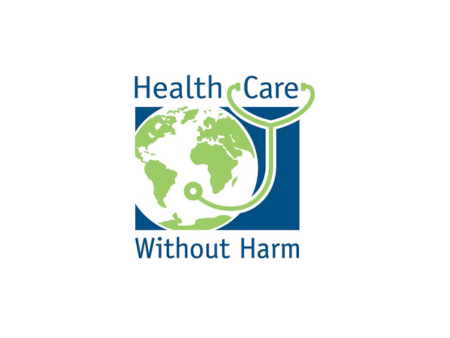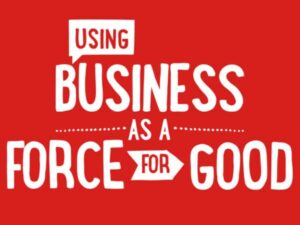Health Care Without Harm mobilizes the health sector to address the climate crisis. The organization has built a vast network of hospitals and health systems and partners with environment NGOs, ministries of health, and international agencies to advance climate smart healthcare policies and business models.
Gary Cohen of Health Care Without Harm spoke with Ashley Hopkinson on November 22, 2023. Click here to read the full conversation with insights highlighted.
Ashley Hopkinson: Can you please introduce yourself and tell me a little bit about the problem that Health Care Without Harm was created to solve? How are you actively solving that problem?
Gary Cohen: I’m Gary Cohen. I’m one of the founders and the president of Health Care Without Harm.
We started Health Care Without Harm because we recognized that it’s impossible to have healthy people on a sick planet, and if we have a global economy that’s built on fossil fuels and toxic chemicals that are poisoning people and poisoning the environment, it’s impossible to build a sustainable and healthy world. If we can leverage the healthcare sector to model this transformation away from fossil fuels and toxic chemicals, and be messengers and advocates for that transformation, that would be a very important contribution to the future of the planet.
We recognized that the healthcare sector represented all the same contradictions of the economy. It was reliant on fossil fuels, it used a lot of toxic chemicals. When it served food to people in different countries, the food was produced through industrial agriculture, which is also poisoning people and destroying the planet’s ecosystem. We’ve been engaged in a broad sort of detox effort of healthcare decarbonization over the last 27 years.
Ashley Hopkinson: That’s incredible. Who are you serving and who’s benefiting from the work that you’re doing?
Gary Cohen: Everyone is benefitting because it’s about getting ourselves off of our addiction to fossil fuels and toxic chemicals. We can think of it as an addiction model.
We started with a very simple device, a mercury thermometer, and said, “Mercury is poisoning the brains of developing children, contributing to learning disabilities, lower IQs, and neurological damage. Let’s get rid of it in healthcare.” We started with one hospital in Boston and got them to eliminate mercury thermometers and blood pressure devices. Thirteen years later, we won a global treaty with the World Health Organization, phasing out mercury from healthcare globally.
When the United States started using medical waste incinerators, the healthcare sector became the largest source of cancer-causing dioxin emissions in the country. There were about 4,500 medical waste incinerators in the US at the time, and a decade later, there were less than 100.
We took those early victories and moved on to a much broader sustainability agenda around the buildings, the food, the pharmaceuticals, the chemicals, the plastics, the waste, the transportation, the water–all of it. Now, we’re really focused on climate as the force multiplier and the greatest public health threat we face on the planet.
We’ve come to understand that the climate crisis everywhere is a health crisis everywhere. Whenever there’s an extreme weather event, whenever there’s a hurricane or a flood or extreme heat days or wildfires or flooding, the health sector, the clinic or the hospital, sits at the epicenter of this trauma; it’s a collective trauma. What we see is that [the healthcare sector] needs to build its own resilience in the face of these events, so that when a disaster happens, the building can stay standing. People who are injured, who are wounded, who are sick, who are suffering heat stress or asthma, can come [and get treatment.]
Healthcare needs to expand its healing mission beyond individuals to healing communities and healing the planet. This is the very first generation of health professionals who have to think at those three levels of scale: individual, community, and planetary. It will have to become the norm, embedded into the DNA of healthcare, for every generation after this. We’re the people who are orchestrating that transformation.
Ashley Hopkinson: That’s a really excellent point. I’m based in New Orleans, so as you can imagine with the hurricane cycles, the hospital needs to be there, and it is there. It definitely plays that role.
Gary Cohen: Katrina was an early lesson. The hospitals all had the backup systems in the basement, charity hospitals had to be evacuated. This is a new way of thinking about the role of healthcare on a planet with nine billion people that is in an ongoing, accelerating crisis. We have to fundamentally shift the role of healthcare so everybody is taken care of because the health of billions of people is beyond their individual control. They’re having to deal with other factors that they are not in control of.
As a matter of global healthcare, universal healthcare access, and global climate justice, we need to take care of everybody. We can’t sacrifice people, we can’t make people expendable. The fossil fuel and petrochemical industries are built on that model of making people expendable, of externalizing the harm they’re creating. That is what we have to fundamentally stop them and transform.
Ashley Hopkinson: What would you say makes Health Care Without Harm and its approach distinctive in this field?
Gary Cohen: We’ve led the effort to bring environmental health injustice into the center of healthcare’s concerns for a quarter of a century. Health professionals, doctors, nurses, and others weren’t educated about the relationship between fossil fuels and health, between toxic chemicals and disease, between buildings and health, or industrial agriculture and health. Eliminating that ignorance is what we’ve been about. We’re bringing the knowledge and the new science on these issues to the sector, and saying, “You’re the one sector in the entire global economy that has healing as its mission. And because of that, because of this Hippocratic oath to first do no harm, you’ve got to clean up your own house. You’ve got to educate your professionals and staff about this, make it a priority, and then you need to be the epicenter for a much broader healing outside of that.”
That’s our role: joining with others to build a movement inside of healthcare, to inspire advocates inside of healthcare who can message out to the entire world. I’ll just say that 11 years ago, Health Care Without Harm and the World Health Organization organized the first Climate and Health Summit at the Climate Conference of Parties. In another week or two, it will be the first Health Day in the Conference of Parties. So in 11 years, we went from being at the margins of piloting why this is crucial to being right at the center of the climate negotiations. Seventy-five countries have signed on to build low-carbon, climate-resilient healthcare systems. It’s been a fundamental sea change and transformation that we have helped execute in a very significant way.
Ashley Hopkinson: Stories of impact tend to illustrate work like this really well, like your mercury story. Do you have any other stories of impact you can share?
Gary Cohen: First, I would say that making climate, health, and equity a fundamental dimension of the climate conversations and negotiations is a really big deal. Mercury was the first campaign to demonstrate how to make change at scale in the sector, moving from one hospital to a global treaty. In the Roman pantheon, Mercury was the messenger god, and here, Mercury was the messenger of environmental health for the health sector. It showed them that, “Wow, we can transform our practices.” Mercury was the gold standard everywhere, and now it’s on the way out, or gone.
We’ve also innovated. There’s this initiative called the Alliance for Transformative Action on Climate and Health, ATACH, which 75 countries have signed onto; we helped build that with the World Health Organization and the British government. We are the partner to what’s called the Race to Zero, which is the UNFCCC [United Nations Framework Convention on Climate Change] strategy. They didn’t have healthcare; they had cities, they had universities, corporations, subnational governments, and investors, but no healthcare.
We’ve got this incredible platform of an ecosystem of partners in 84 countries now, and we said to those people, “You need to get involved in this Race to Zero. You need to make commitments toward net-zero healthcare.” And there are now over 14,000 hospitals in 28 countries that have made these commitments, and we’re working with them on implementing all that. Those are statements of impact, at scale, that matter.
If you’re about this transformation on the planet, it’s not about individuals alone, it’s not about organizations; it’s about building movements. I’ve seen the Skoll Foundation also rethink its work so that it’s about building these ecosystems of change agents: organizations, players, governments, NGOs, businesses, civil society, and indigenous people, all working toward a much broader movement strategy. I think that’s accurate. I think that’s the way change happens. I’ve been honored to be part of the arc of that journey.
Ashley Hopkinson: How is Health Care Without Harm working towards system change in the healthcare field?
Gary Cohen: From the beginning we said, “There’s never going to be a building that says Health Care Without Harm. We’re going to build a platform of nurses, doctors, health professionals, and community partners around the world who get this and are part of this transformation.”
We do our part as systems orchestrators to provide the rationale, ethical frameworks, measuring tools, how-to guides, and peer-to-peer learning efforts so people are meeting with others to accelerate their learning. That’s been our MO from the very beginning, and it’s been incredibly effective. For the amount of money that we’ve been able to raise and the amount of impact we’ve had, the transformations that have occurred have been unbelievable.
Ashley Hopkinson: Has there been a partnership that you feel has really helped in accelerating that kind of system change?
Gary Cohen: Yes. When we started in 1996, in the United States, two healthcare systems joined our efforts. It was very early stage. One was Kaiser Permanente, a large integrated healthcare system based in California, with 12 million members and 40 hospitals, and the other was a group called Catholic Healthcare West, which was a very significant faith-based hospital system. From the very beginning, we had God and size on our side. We used to joke that if we had been a rock band, we would’ve been called Kaiser and the Catholics. Because what happened is when the other Catholic system saw that Catholic Healthcare West was part of this thing, they said, “Okay, we trust that.”
Kaiser is a very big leader in the US healthcare space. They’re super well-respected, so it helped us bring all these other healthcare systems into the fold. Now, the network that we’ve built in the United States includes more than a quarter of all the hospitals in the country. We’ve gotten this scale and aggregation that can transform markets, transform products, transform mindsets, and transform policy because we bring them together and build on the collective.
We worked with Kaiser in what’s now called Common Spirit, to move into the international sphere and go to the Conference of Parties on Climate to model commitments around environmentally-responsible, climate-smart healthcare. Common Spirit came to the Paris Treaty and said, “We’re phasing out coal in our investments.” These validators have helped us in the international sphere in not only building validation for our work, but also in demonstrating what healthcare systems should be doing.
Ashley Hopkinson: What’s needed from other people, other actors, and partners that work in this space?
Gary Cohen: There are a couple of things. The core message that we’re bringing to this COP [Conference of the Parties] in Dubai is that, as a civilization, we need to phase out fossil fuels as the greatest public health intervention that we can make on the planet. It’s the thing that will improve the health of billions of people, and it will also solve for climate change. Other sectors need to be clear that fossil fuels are the heart of the wound. Those industries are not only poisoning the climate, they’re poisoning our bodies, and they’re poisoning democracy.
Healthcare can model that, and create the political space for others. It shouldn’t just be healthcare saying we need to phase out fossil fuels as core. Healthcare bringing the health dimension to that discussion is very powerful. It’s much more interesting to say, “We’re doing this because we’re trying to prevent asthma; we’re trying to prevent billions of people dying from heat stress; we’re trying to prevent more climate refugees than war refugees,” than to say it’s about polar bears on the melting ice caps. It needs to be proximate to what people care about, and they care about their health and the health of their children, their families, and their communities.
Healthcare can bring that, and other sectors, other players, can also embed health as a core dimension of why we’re doing all this in the first place. Why are we trying to deal with the climate? Because it’s about the health of everybody on the planet. I think those are two very important concepts that we in healthcare can bring to the larger movement, and partner with the larger movement.
The third thing I would say is we need to remove the social license of the fossil fuel industry and the petrochemical industry because their business model requires the externalization of harm. It’s a global phenomenon. But if they had to internalize the environmental and public health damage they are causing through their regular operations, they’d go out of business. So that has to change.
I think healthcare can be a powerful vehicle for removing that social license. For example, you wouldn’t have tobacco companies negotiating a global framework for tobacco control. But now, you have the fossil fuel industry showing up at these climate negotiations with more people than any country. In fact, the head of this year’s climate negotiations is the head of the oil company in the United Arab Emirates. Talk about poisoning the process. As a civilization, we need to figure out a phase-out of this industry. It’s come to a point where we have to decide whose rights we’re going to champion on the planet: the rights of our children and our communities to have clean air, clean water, healthy food, and a safe place to live, or the rights of the fossil fuel and petrochemical industries. It can’t be both.
Ashley Hopkinson: I want to take us back quickly to the organizational work and ask you what insights or teachable lessons can be taken from what you’ve been doing? What strategies have you found to be valuable, and why were they valuable?
Gary Cohen: One is if you highlight the problem that you’re trying to address, you also need to highlight others’ efforts and work with them toward the solution. It’s not enough to say, “You’ve got a problem, you’ve got a crisis.” You’ve got to give people the ability to form a solution so they can address it. You’ve got to model those solutions and have the ability to scale those solutions. It requires a kind of network approach and an ecosystem approach to scale solutions. A lot of entrepreneurs get stuck with, “I’ve got this incredible model, and I’ve done it over here, but I don’t have the ability to scale it.” Building that into the DNA of the strategy from the get-go is really important.
The other is creating a community of practice and peer-to-peer learning so you can accelerate and short-circuit everybody’s learning curve, and say, “Oh, he did it over there. That hospital became energy-independent. How did you do it? Tell me so I can learn.” It needs to be at that CEO to CEO, nurse to nurse, doctor to doctor, community leader to community leader level. Building that community of practice is really important.
We have always been saying, “Here’s the roadmap that you want to get there.” Creating those roadmaps for people, building tools for people, we’ve done all that. It’s giving people what they need to take the next steps along this transformation journey. Then, celebrate success. Not the success of the leader, the social entrepreneur, but the success of everybody, so that people can lead from any seat, and you’re helping people develop agency. When leadership is very distributed, you’re creating social change-makers, or global healers, all across the ecosystem.
You can see some of the tools that we built on the website www.healthcareclimateaction.org. There’s a whole curriculum for nurses. How do you become a nurse advocate? There’s a whole roadmap to decarbonize. There are measuring tools, case studies. It’s all embedded in that site, and it shows the kinds of things that we’ve done. I think you could do this kind of stuff in any field.
Ashley Hopkinson: I love that you have mapping-out tools, so someone else can literally pick up the baton and take it to the next level.
Gary Cohen: Yes. If you have a global or regional system, innovation can happen, not only from the center, but from anywhere. Then you can bring it in and you can spread it. It’s not necessarily a hub-and-spoke model, but it’s not centralized, so it’s not limited to only going from the center out; innovation can happen across the entire ecosystem. For instance, there’s a hospital that does eye surgery in India, and they do it at a fraction of the cost that everybody else does. They do more eye surgeries than anybody in the world at high quality, and they do it at 90% less of a climate footprint than a similar hospital in Britain. Okay. What can we learn from that hospital? That’s powerful.
Ashley Hopkinson: How do you measure success in Health Care Without Harm, and what’s the evidence that you’re making progress?
Gary Cohen: There are a lot of them. One is the breadth of the network itself. Skoll actually helped give us the resources to build that network globally, and the fact that we’ve got partners in 84 countries now is a big deal. In the US, we created a healthcare climate council of 21 leading systems that represent over 600 hospitals across 43 states, and we are using them to leverage policy at the national scale, so they’re able to access the Inflation Reduction Act resources, and they’re able to advocate for climate-smart healthcare as policy advocates. We also worked with the administration in the United States to develop a pledge for healthcare to decarbonize. There are almost 1,200 hospitals that have committed to this, which is almost a fifth of all the hospitals in the country.
We’re creating economies of scale and critical mass so this will become standard, this will become policy, this will become the way that healthcare operates around the world. We’re seeing that at a policy level, and we’re seeing that at a market level. Hospitals around the world are starting to phase out an anesthetic gas used for surgery that is 2,000 times more potent than carbon dioxide. So there’s transformation in the marketplace, there’s transformation in the policy realm, and there’s the expansion of participants in healthcare coming to Jesus on this around the world. That momentum is a major element of success. The fact that there is a Health Day now at this climate negotiation is itself a testament to the mobilization that we’ve been doing.
Ashley Hopkinson: Is there anything that you’ve implemented or integrated that didn’t work as well as you’d hoped, that someone else can learn from?
Gary Cohen: Yes. We tried to set up a purchasing cooperative in the United States market called Green Health Exchange. We wanted to model the kind of innovative products and technologies that we thought the future of healthcare should be broadly adopting. I thought, “Wow, this is really going to take off. All these big systems are going to start buying through us. We’re going to get some fees from it. It’s going to be the engine for our entire organization.” It hasn’t worked out that way because of the incumbent purchasing power of large corporations.
There are three big companies that are the Sam’s Club of healthcare, and their purchasing volume is something like $250 billion. We were competing with them, essentially, and at the end of the day, we couldn’t compete on price. The hospital system said, “Look, we care about environmentally-preferable products and technologies, but we also have these bottom-line interests we have to deal with. So we’re going to stick with these group purchasing organizations.” That didn’t work out the way we’d hoped.
Now, it’s covering its own expenses, but it’s not this big thing that I thought was going to happen. We’ve had to pivot and say, We’re not ever going to be that innovation engine on the purchasing side. We can’t compete against these mafia of companies, but we can still be the ones that are setting the standards. What is green, what is climate-smart, what is toxic-free? We can model that for the rest of the sector.
We’ve moved into more of a Good Housekeeping Seal. We’re saying, “Okay, this furniture doesn’t have these toxic materials in it, this company has met this criteria and can advertise that as you sell it to everybody else.” We’ve been pivoting toward that, which is a pretty big change from my fantasy of what was going to happen.
Ashley Hopkinson: What would you say you learned from that? Do you have an important lesson?
Gary Cohen: Capitalism has a way of adapting, and it’s interesting where mission and values run up against money.
Ashley Hopkinson: Aside from funding and making sure that you’re reaching all the sustainable points, are you facing any other challenges in this work? What do you feel like you’re up against at this stage?
Gary Cohen: One of the big issues we are all dealing with is people’s despair with the way the world is working and moving, and the psychological traumas that people bring in historically because of race, because of economic disparities, because of war, because of any number of things, as well as the collective trauma that we face, that we learned about through COVID and climate. Building people’s resilience and wellness in the face of all of this as change-makers and actors inside of our sector and in the world, is a really important piece of the puzzle that we need to focus on.
The world’s going to get more dangerous and more complicated, and the threats to democracy, the threats of fascism and war, are going to increase as more and more people are made refugees. The fight over the remaining oil and gas is going to accelerate. Supporting individuals, but also organizations that can hold the resonance that can stand in the spiritual and psychological wellness of all this, is going to be crucial. It’s not just about whether we’re meeting 50% of our goals by 2030. It’s so much bigger than that. People have to see this as an intergenerational struggle.
Beyond individual action and organizational action, we’re building the greatest movement in the history of the world, and we are all players in it, but at the same time, it’s way beyond all of us. Holding that perspective and working on our own resilience, our own wellness, our own organizational wellness, and our own movement wellness, I think, is going to be a critical challenge over the next couple of decades.
Ashley Hopkinson: I want to close by asking you where you see Health Care Without Harm going in the next five years.
Gary Cohen: I think we’re going to be implementing three fundamental transformations focused on the sector. One is to build scale to decarbonize and detoxify the sector across the entire globe. Two is to build resilience in the face of climate disasters and build the infrastructures and healthcare systems to handle what is coming. And to do all this in partnership with communities, where there are a lot of assets and knowledge about what’s needed. So both mitigation and resilience.
The third is leadership and building this movement inside of healthcare for health professionals to change the narrative on the climate crisis and to focus on health. [We want to] bring their voices and their power to these policy realms, to accelerate our transformation away from fossil fuels and toxic chemicals. That’s what we’re going to do.
Ashley Hopkinson: This has been a great conversation. I really appreciate your time.
Click here to read the full conversation with insights highlighted.
Ashley Hopkinson is an award-winning journalist, newsroom entrepreneur and leader dedicated to excellent storytelling and mission-driven media. She currently manages the Solutions Insights Lab, an initiative of the Solutions Journalism Network. She is based in New Orleans, Louisiana.
* This interview has been edited and condensed.
Learn about other social innovations to address the climate crisis.







